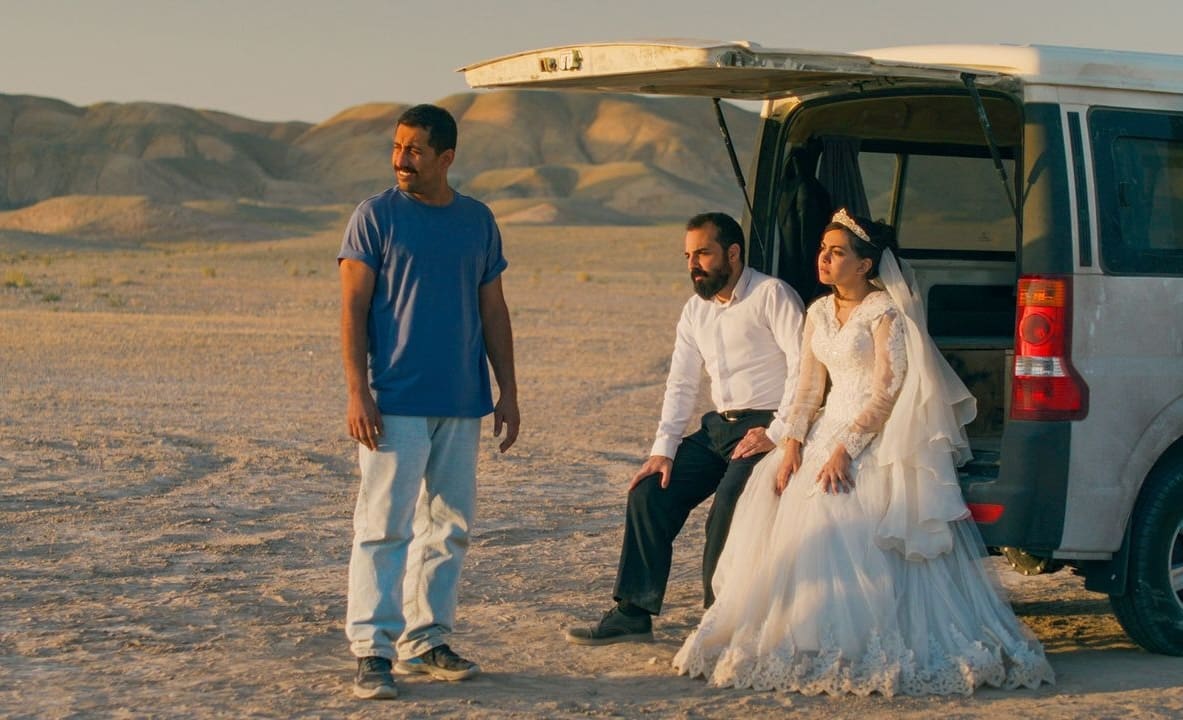
It’s no surprise that director Jafar Panahi’s Palme D’Or winning-film, It Was Just an Accident, is a deeply personal exploration of political repression given Panahi’s own imprisonment for criticisms of the Iranian government. But, it’s also a remarkably thrilling and surprisingly comical film about morality that easily gets its hooks into you.
Panahi filmed It Was Just an Accident without the permission of the Iranian government, giving it a natural sense of secrecy that drips throughout a mysterious first act. At first, it seems like we’re going to watch the life of a man named Eghbal (Ebrahim Azizi) play out after he accidentally hits a dog while driving home late at night. However, a stop by the local mechanic shifts the story towards Vahid (Vahid Mobasseri), a man who seeks revenge against Eghbal for tortuous acts as a former government officer.
It’s an incredibly well-crafted opening that effectively utilizes the light thrills of Vahid’s revenge plan. The scenes of Vahid tailing Eghbal undetected are incredibly tense and some of the close camera work settles you into the uneasy danger. Panahi generally keeps viewers in the dark with what happens next, so Vahid’s decisions come off shocking and full of sudden emotion. Then, Panahi takes things towards darker territory where Vahid puts himself in a tough spot after taking action.
Despite his sureness when he starts following Eghbal, Vahid can’t fully confirm if Eghbal is definitely the man who tortured him or if it’s right to kill him. Now, to be fair, we’ve seen films tackle morality like this before. Some simply do it in one scene or through a singular thematic thread within a larger story. Here though, Panahi puts a special focus on whether Vahid will become the monster he’s exacting revenge on in a way that creates real depth and remains intriguing the whole way through. And, Panahi does a great job not only maintaining the personal thrills, but also injecting some unexpected comedy as Vahid clearly becomes in over his head.
It’s hilarious how Vahid’s intended solo mission becomes crowded with a host of odd characters seeking vengeance against Eghbal, which doesn’t make things go smoother. Their quarrels are comical and an angry worker named Hamid (Mohamad Ali Elyasmehr) often brings some comedic relief through freakouts over the group’s indecisiveness. Even some of the situations this group find themselves in are wildly funny. Unforeseen obstacles, like a distressing call the group can’t ignore or a close brush with police that causes the group to come up with some dumb reasoning for their presence, hilariously almost blow things up. Panahi expertly finds levity in this otherwise tense situation that causes crowd-pleasing laughs.
Yet, even with there being these funny beats, the film never forgets the underlying darkness that brings this group together. The way they talk about the humiliation, pain, and suffering they endured and still feel the effects of is absolutely crushing. The film really immerses you into the mindset of a political prisoner whose trauma can’t be wiped away with time, and there’s a lot of relevancy to this with all the global conflicts happening around the world.
It’s an experience that definitely connects you more to refugees currently surviving politically-driven wars, like Ukraine or the Gaza-Israel conflict. It’s why the narrative has such a raw power to it and, at times, you almost wouldn’t blame these people for exacting revenge without remorse. Yet, Panahi adds an important layer of morality to these characters that gives the film greater depth. It’s where the film digs deep into what it means to be human, and watching these characters debate forgiveness, revenge, and even swallowing pride is a riveting swell of emotion. Plus, these performances, especially Mobasseri’s, help shape this moral complexity further.
Mobasseri is astonishing as he showcases a range of emotion and skill that makes Vahid such an intriguing lead character. He’s able to be dimwittingly funny and darkly serious in the same breath without losing his determination to see “justice” play out. He delivers raw emotion when confronting his vengeance head-on, and the inner turmoil he wrestles with is palpable. Mobasseri is what makes the film have this realistic pull and, honestly, he needs to be a part of Oscars talk. He’s also joined by a supporting cast who adds different perspectives and trauma that builds a more well-rounded portrayal of this conflict. .
It all leads to a final stretch that perfectly teeters the lines of revenge and forgiveness, and acts as the tense centerpiece of Panahi’s vision. While the frustrations boiling within Vahid and others are fairly contained, everything bursts out for a final confrontation that leaves you panicked and wiping sweat away. The tension finally boils over in a way that makes you scared of where things could be heading and just in awe of the anger being spilled out. It’s where Azizi is also finally able to shine as well as we witness Eghbal come to grips with himself with no restraint.
Even better, Panahi uses no cuts and creates a lighting that highlights the dark tones of Vahid and Eghbal finally coming head to head. It’s an amazingly crafted sequence that doesn’t disappoint and builds towards satisfying ends. The final moments emphasize the humanity sewn into every aspect of this story while still creating one last instance of fear you struggle to catch your breath with. Seriously, those last couple of shots and sounds are haunting and leave things on an ambiguous yet fulfilling note, a rare and noteworthy combination.
It Was Just an Accident is an incredibly tight, powerful, and surprisingly funny narrative from Panahi that ranks among the best of the year. It offers a deep insight into personal trauma that reflects a wider issue that’s sadly continuing to grow, especially as wars and ideological conflict grow throughout the world. It’s what makes the film truly of the moment and a necessary watch for a little bit of cathartic soul searching.

